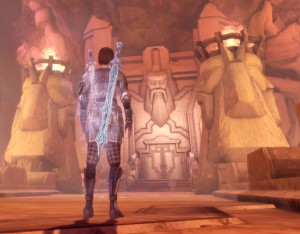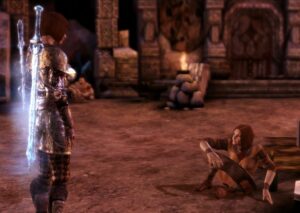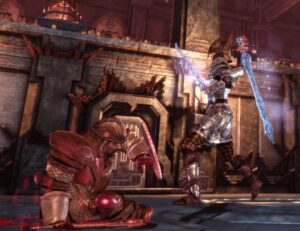Free Orzemmar!
Friend of The Reticule, Thomas Senior is a big fan of Dragon Age, in this guest article he talks about Dwarven society in Dragon Age.
I’m in the great golden halls of Orzemmar, the majestic underground Thaig that serves as home for most of the Dwarven people. The huge stone doors are closed to outsiders thanks to the intense political strife that’s raging within. As a Grey Warden you are the only foreigner wandering Orzammar’s streets and your status as a warrior carries weight among the Dwarves, for whom physical prowess and victory in battle has long been seen as an indication of ancestral favour. The situation here is dire. The throne of Orzemmar is up for grabs and various parties are vying to take the crown. Rival bands of fanatics confront each other on the streets, spilling blood to protect the name of their would-be ruler. Dwarves, it seems, take their politics extremely seriously.
The situation here is so complex that I am forced to bring my own personal politics to play. The caste system entrenches Orzammar’s citizens in the inescapable bonds of tradition. Every Dwarven child’s future is predetermined by their ancestors. Smiths raise smiths, nobles give birth to nobles, and the casteless are born into a poverty from which they can never escape. They spend their lives begging in the poor districts, invisible in the eyes of their society. the commonly held view is that they should never have been born, and mothers are urged to leave bastard newborns in the Deep Roads to be taken by the Darkspawn.
And here I enter, an outsider wielding a certain amount of political clout. Circumstances have conspired to grant a surface dweller a significant say in the future of Orzammar. My first response is an emotional one. I want to tear down the status quo and reform Dwarven culture into something less fundamentally unfair, less broken. I would create a Dwarven town on the surface into which the casteless could create a splinter society in which they would have jobs, homes, food and a chance to choose their own destinies. Those who didn’t want to leave would have apprenticeships to the working castes giving the hopeless hope and creating a determined new labour force in Orzammar. These industrious new workers would concentrate on channelling the Dwarves’ remarkable crafting skill into something marketable. More trade routes would open to the surface, and the economic realities of large scale trade would inevitably lead to a certain amount of cultural exchange. Orzammar needn’t be a hidden mystery in Ferelden.
I stop just short of drawing up campaign leaflets.
It’s not that simple. Of course the urge is to charge into a new culture that I don’t fully understand and right the perceived wrongs I see there. To forcibly change this society into something more familiar would be a rotten kind of imperialism. I would seek to normalise their social structures, but I would only be spreading the biases of my own. It’s not my place to engineer the Dwarves into something they’re not and considering the state of politics on the surface I’m hardly in a position to advocate a new form of government. The human civil war undermines any ideas I have of changing things in Orzammar for the better. Besides, there’s another element at play here.
The truth is that I don’t have time to consider the wellbeing of the Dwarves, I need to unify them quickly and make sure they are in a position to honour my cause and help stop the Blight. By necessity, my course of action must be one of swift social engineering. I must back a candidate for the throne, and ensure that they honour the ancient promises they made to the Grey Wardens. For all my hatred of the Dwarves’ tendencies to allow their ancestors to decide their future, I’m relying on the pledges that those very ancestors made a hundred years ago to aid the Grey Wardens in times of Blight.
Nevertheless I spend a lot of time in the slums. I give what coin I can to the beggars there. Where I can I encourage them to head to the surface. It’s not easy up there, I say, but you can carve out a life for yourself. Up there your future isn’t decided. You needn’t live a life of abuse and poverty, and you needn’t doom your children to the same fate. It’s not enough, I know. But it’s all I can do.
It’s a soul-wrenching situation, and it’s a feeling unique to gaming. Only in an interactive world can my decisions have such an impact on the future of an entire race. I’ve read many a fantasy epic, and have admired many of the complex worlds authors have constructed. I’ve enjoyed reading of adventures within those world, but never (thankfully, for the sake of my sanity) has a character within those pages turned to me and asked “what do you think?”. It’s at that moment that these fantasy issues of a fantasy race becomes suddenly important, and their world becomes real.
It’s rare that I’m engrossed in a game world to such a degree, and it’s a testament to the quality of Dragon Age’s storytelling that I find myself drawn into such lengthy internal debates about my course of action. It pains me to hear Dragon Age lazily dismissed as being cliched. Looking at the loosest overview, it is. ‘You’re one of the select few charged with stopping the onset of an ancient evil that threatens to destroy the world’. We’ve all heard that one before. But to concentrate on this overview is to ignore everything that’s interesting about the history and people of Ferelden, and everything that’s great about Dragon Age. The soul of this game lies in the details, the cultural minutiae of it’s inhabitants, and in the vast, carefully crafted and genuinely fascinating history that lies behind every town, and every race in Ferelden.
Former World of Warcraft Director Jeff Kaplan once told an audience at GDC “we need to stop writing a fucking book in our game, because nobody wants to read it.” But that’s exactly what Bioware has done here with Dragon Age. Your journal quickly swells to novel size over the course of the game. Whenever you discover a new area, or meet someone interesting, or click on a peice of artwork another entry is added until you have thousands of words explaining every little detail of the world, describing characters and races that you won’t even meet in the course of the game. Kaplan’s point is valid, of course. Logically, it’s a waste of resources to put so much time and effort into something that often won’t be read by the player, but in the case of Orzemmar and the world of Ferelden the book matters.
It puts me in mind of The Hobbit. It’s Tolkien’s most charming and accessible work. It’s not as complex or epic as Lord of the Rings but it’s special because that odd world of wizards and dragons seemed so fascinating and real. Tolkien’s obsession with detail meant that the world he envisaged was internally perfect. All of the lore that he would later make explicit in Lord of the Rings and the Silmarillion added credence to Middle Earth and the characters who lived there. The care taken over the world leaked into the story, into the locations and the races and this all made The Hobbit special. Dragon Age isn’t so different. The book, the lore and history of the world, seems to have a proved a good reference point for the development team. It’s one thing for a man to create a world, another for a huge team of people to realise it virtually. Even the stoic Aztec flavour of the architecture in Orzemmar seems to exemplify the rigidity of Dwarven society. Keeping the artists, writers and designers on the same page on a project as huge as Dragon Age is no small feat, but when everything comes together and the result is as good as this, then you really have something worth celebrating.


